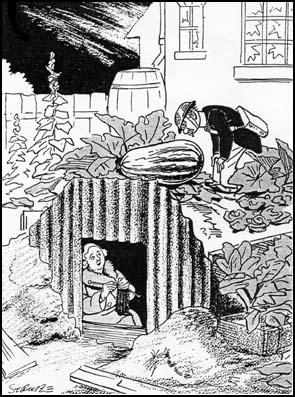Anderson Shelter Gardens

WHEN you're used to today's glamorous gardens, it's difficult to
imagine what things were like for our grandparents - or possibly great
grandparents - gardening in the 1940s. They had no tasteful patios, no comfy
garden furniture or the enormous range of plants that we take for granted
today, let alone extras like gazebos, gas barbecues and hot tubs. Frankly, it
was all very basic. Wartime gardening was all about survival. Very little food
was reaching this country from overseas, thanks to Hitler's U-boats sinking
merchant shipping in the mid-Atlantic and, in the spring of 1940, rationing
began. Everyday groceries such as sugar, butter, cheese, tea, cooking fat, meat
and bacon - even sweets - were limited to a few ounces per person per week, so
people had to fall back on what their gardens could produce.
The Dig
For Victory campaign began in September that year, and everyone was encouraged
to dig up their flowers and stripy lawns in favour of food production to help
the war effort. Fun gardening was to vanish for years. The main feature of town
gardens in wartime was the Anderson shelter. It was a big hole in the ground,
roofed with curved metal sheets, on top of which all the excavated soil was
piled, to provide extra shock-proofing. Down below, families put bunk beds and
a few home comforts to sustain them when the air-raid sirens sounded and they
had to take cover.
But inventive gardeners could make an Anderson
shelter quite productive - inside, in the dark, they'd force rhubarb or raise
mushrooms and outside, over the roof, they grew marrows. No, none of your fancy
courgettes - these were huge, tasteless monsters which were stuffed with
breadcrumbs and flavoured with herbs, fat and any savoury leftovers to make a
typical thrifty wartime favourite called "mock goose" or the marrow, apple and
ginger jam that people made instead of marmalade - oranges were simply
unobtainable.
The rest of the back garden would be put down to veg, but
nothing too fancy. What you needed were nutritious crops that filled you up.
Runner beans were reliable, heavy croppers, and you could bottle or salt down
your surplus, while winter veg, such as kale, cabbage and root crops, were
vital for keeping the kitchen provided during the difficult months. Carrots,
being sweet, were grated into cake and pudding mixture instead of sugar and
parsnips could be baked with treacle to make "mock bananas."
If you
have the room, you'd also have a hen run and rabbit hutches. Livestock was a
great way of recycling garden rubbish as meat and eggs, and also meant free
manure to put back on the garden. Sometimes groups of friends would start a pig
club, pooling their kitchen scraps to feed a piglet, and then sharing out the
hams and chops. Even the garden shed earned its keep. It was where you made
your home brew, stored root crops, kept preserving pans and saved up empty jars
and bottles ready for refilling. Smokers would grow their own tobacco plants in
the garden then hang the giant leaves up in the shed roof to cure - it was
allowed, as long as it was for your own use. Results were pretty variable, by
all accounts, and a lot of smokers took to rolling their own, using mixtures of
bramble leaves, wild herbs and suchlike instead - it must have been like
puffing on an old bonfire. Front gardens would often be turned over entirely to
spuds. They would keep well for months and could be dished up in hundreds of
different ways. Flowers were out. If you grew any at all they had to be useful
ones; nasturtium leaves were recommended for making into sandwiches, due more
to their high vitamin C content. So next time you're picking your way through a
packed garden centre or an overflowing mail order catalogue of garden goodies
and wondering what to have next, just think how well-off we are today. We've
never had it so good.
Source: Alan Titchmarsh www.express.co.uk
|